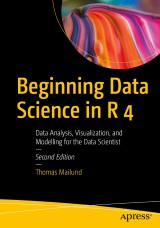Details

Beginning Data Science in R 4
Data Analysis, Visualization, and Modelling for the Data Scientist2nd ed.
|
56,99 € |
|
| Verlag: | Apress |
| Format: | |
| Veröffentl.: | 23.06.2022 |
| ISBN/EAN: | 9781484281550 |
| Sprache: | englisch |
| Anzahl Seiten: | 518 |
Dieses eBook enthält ein Wasserzeichen.
Beschreibungen
<div>Discover best practices for data analysis and software development in R and start on the path to becoming a fully-fledged data scientist. Updated for the R 4.0 release, this book teaches you techniques for both data manipulation and visualization and shows you the best way for developing new software packages for R. </div><div><br></div><div><i>Beginning Data Science in R 4, Second Edition</i> details how data science is a combination of statistics, computational science, and machine learning. You’ll see how to efficiently structure and mine data to extract useful patterns and build mathematical models. This requires computational methods and programming, and R is an ideal programming language for this. </div><div><br></div>Modern data analysis requires computational skills and usually a minimum of programming. After reading and using this book, you'll have what you need to get started with R programming with data science applications. Source code will be available to support your next projects as well.<div><br></div><div>Source code is available at github.com/Apress/beg-data-science-r4.<br><div><br></div><div><br></div><div><b>What You Will Learn</b><div><ul><li>Perform data science and analytics using statistics and the R programming language<br></li><li>Visualize and explore data, including working with large data sets found in big data<br></li><li>Build an R package<br></li><li>Test and check your code<br></li><li>Practice version control<br></li><li>Profile and optimize your code<br></li></ul></div><div><b><br></b></div><div><b><b>Who This Book Is For</b></b></div><div><b><br></b></div><div>Those with some data science or analytics background, but not necessarily experience with the R programming language.</div></div></div>
<div>1: Introduction.- 2: Introduction to R Programming.- 3: Reproducible Analysis.- 4: Data Manipulation.- 5: Visualizing Data.- 6: Working with Large Data Sets.- 7: Supervised Learning.- 8: Unsupervised Learning.- 9: Project 1: Hitting the Bottle.- 10: Deeper into R Programming.- 11: Working with Vectors and Lists.- 12: Functional Programming.- 13: Object-Oriented Programming.- 14: Building an R Package.- 15: Testing and Package Checking.- 16: Version Control.- 17: Profiling and Optimizing.- 18: Project 2: Bayesian Linear Progression.- 19: Conclusions.</div>
<div>Thomas Mailund is an associate professor in bioinformatics at Aarhus University, Denmark. His background is in math and computer science but for the last decade his main focus has been on genetics and evolutionary studies, particularly comparative genomics, speciation, and gene flow between emerging species.</div><div><br></div>
<div>Discover best practices for data analysis and software development in R and start on the path to becoming a fully-fledged data scientist. Updated for the R 4.0 release, this book teaches you techniques for both data manipulation and visualization and shows you the best way for developing new software packages for R.</div><div><br></div><div><i>Beginning Data Science in R 4, Second Edition</i> details how data science is a combination of statistics, computational science, and machine learning. You’ll see how to efficiently structure and mine data to extract useful patterns and build mathematical models. This requires computational methods and programming, and R is an ideal programming language for this. </div><div><br></div><div>This book is based on a number of lecture notes for classes the author has taught on data science and statistical programming using the R programming language. Modern data analysis requires computational skills and usually a minimum of programming. </div><div><br></div><div><b>What You Will Learn</b><div><ul><li>Perform data science and analytics using statistics and the R programming language<br></li><li>Visualize and explore data, including working with large data sets found in big data<br></li><li>Build an R package<br></li><li>Test and check your code<br></li><li>Practice version control<br></li><li>Profile and optimize your code</li></ul></div></div>
Gives you everything you need to know to get started in data science using R language Updated for R programming language version 4.0 A unique book by a data science expert and is based on a successful lecture series
<div><br></div><div><br></div>
Diese Produkte könnten Sie auch interessieren:

A Software Process Model Handbook for Incorporating People's Capabilities

von: Silvia T. Acuna, Natalia Juristo, Ana Maria Moreno, Alicia Mon

149,79 €















